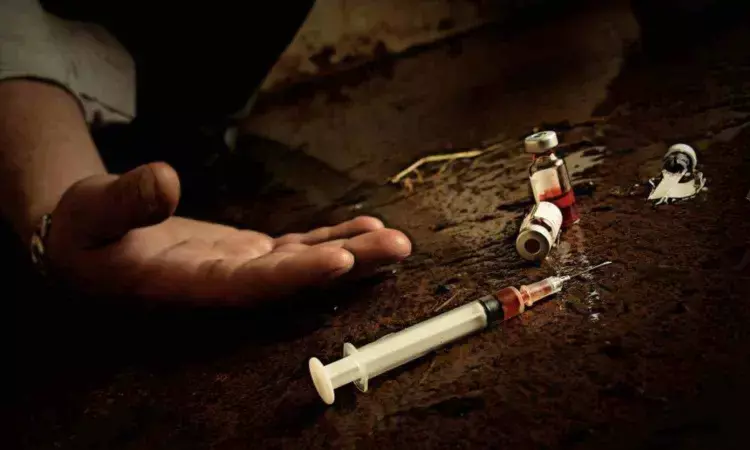- Home
- Medical news & Guidelines
- Anesthesiology
- Cardiology and CTVS
- Critical Care
- Dentistry
- Dermatology
- Diabetes and Endocrinology
- ENT
- Gastroenterology
- Medicine
- Nephrology
- Neurology
- Obstretics-Gynaecology
- Oncology
- Ophthalmology
- Orthopaedics
- Pediatrics-Neonatology
- Psychiatry
- Pulmonology
- Radiology
- Surgery
- Urology
- Laboratory Medicine
- Diet
- Nursing
- Paramedical
- Physiotherapy
- Health news
- Fact Check
- Bone Health Fact Check
- Brain Health Fact Check
- Cancer Related Fact Check
- Child Care Fact Check
- Dental and oral health fact check
- Diabetes and metabolic health fact check
- Diet and Nutrition Fact Check
- Eye and ENT Care Fact Check
- Fitness fact check
- Gut health fact check
- Heart health fact check
- Kidney health fact check
- Medical education fact check
- Men's health fact check
- Respiratory fact check
- Skin and hair care fact check
- Vaccine and Immunization fact check
- Women's health fact check
- AYUSH
- State News
- Andaman and Nicobar Islands
- Andhra Pradesh
- Arunachal Pradesh
- Assam
- Bihar
- Chandigarh
- Chattisgarh
- Dadra and Nagar Haveli
- Daman and Diu
- Delhi
- Goa
- Gujarat
- Haryana
- Himachal Pradesh
- Jammu & Kashmir
- Jharkhand
- Karnataka
- Kerala
- Ladakh
- Lakshadweep
- Madhya Pradesh
- Maharashtra
- Manipur
- Meghalaya
- Mizoram
- Nagaland
- Odisha
- Puducherry
- Punjab
- Rajasthan
- Sikkim
- Tamil Nadu
- Telangana
- Tripura
- Uttar Pradesh
- Uttrakhand
- West Bengal
- Medical Education
- Industry
GLP1R Treatment Linked to low Suicidal Ideation in Adolescents with Obesity: JAMA

.
Researchers found that adolescents treated with a glucagon-like peptide 1 receptor agonist (GLP1R) for obesity experienced lower risk for suicide ideation or attempts. A recent study was published in the journal JAMA Pediatrics conducted by Liya Kerem and Joshua Stokar. The study aimed to investigate the psychiatric safety of GLP1R treatment in adolescents.
This was a retrospective cohort study using the data from the TriNetX global federated network that aggregated electronic health records from 120 health care organizations. Obese adolescents aged 12 to 18 years were selected. One group was subjected to GLP1R treatment while the other group was the control, only receiving lifestyle interventions with no GLP1R. The number of adolescents selected in the GLP1R group was 4052, and the number selected for the control group was 50,112. After propensity score matching, the cohorts matched. From both groups, 3456 participants' outcomes were compared.
The main exposure was the initiation of GLP1R treatment for obesity, compared to a control group who received lifestyle interventions but no GLP1R. The main outcome measured was the incidence of suicidal ideation or attempts within 12 months of treatment, evaluated through ICD-10 codes from patient electronic health records. Gastrointestinal symptoms were also explored as a positive control and upper respiratory tract infections (URTI) as a negative control to validate the findings.
• GLP1R treatment was linked to a 33% reduced risk of suicidal ideation or attempts relative to control (1.45% vs 2.26%; hazard ratio [HR], 0.67; 95% CI, 0.47-0.95; p = 0.02).
• This finding suggests that GLP1R may be associated with a favorable psychiatric safety profile for adolescents who are obese, thereby decreasing the anxiety related to its increased predisposition to suicidality.
• Greater rates of gastrointestinal symptoms were found in the GLP1R arm (6.9% vs 5.4%; HR, 1.41; 95% CI, 1.12-1.78; p = 0.003).
• No group differences were observed for the rates of URTI diagnoses; this supports the idea that the study's design was appropriate to control for unrelated health outcomes.
In conclusion, the study demonstrated that obese adolescents treated with GLP1R resulted in reduced suicidal ideation or attempts, thereby ensuring that the psychiatric safety profile is favourable. These results reassure the consideration of GLP1R agonists in the management of obesity but underscore the importance of further research in the mental health consequences of obesity treatment. Future studies will help clear up the higher-order effects of GLP1R on adolescent well-being and help more clearly refine treatment approaches for obesity management.
Reference:
Dr Riya Dave has completed dentistry from Gujarat University in 2022. She is a dentist and accomplished medical and scientific writer known for her commitment to bridging the gap between clinical expertise and accessible healthcare information. She has been actively involved in writing blogs related to health and wellness.
Dr Kamal Kant Kohli-MBBS, DTCD- a chest specialist with more than 30 years of practice and a flair for writing clinical articles, Dr Kamal Kant Kohli joined Medical Dialogues as a Chief Editor of Medical News. Besides writing articles, as an editor, he proofreads and verifies all the medical content published on Medical Dialogues including those coming from journals, studies,medical conferences,guidelines etc. Email: drkohli@medicaldialogues.in. Contact no. 011-43720751


